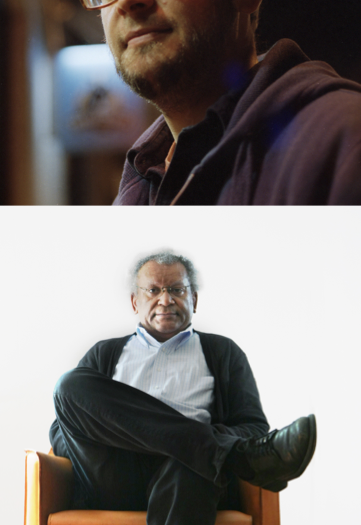Nate Wooley’s Battle Pieces was conceived as a background for an improviser, working with linguistics, tape processes and aleatoric concepts to fashion an ever-shifting composition that supplies the soloist with specific musical information within the context of an ever-changing series of densities, velocities and silences. Each member of the quartet is soloist for one piece, written to highlight and push the limits of their improvising vocabulary, switching to play with the notated trio on the others.
Anthony Braxton’s Composition No. 146 follows in the composer’s tradition of pieces for highly unusual instrumentation (such as Composition No. 19 for 100 tubas, Composition No. 103 for 7 costumed, choreographed trumpeters, or his early Composition No. 9 for four amplified shovels and a pile of coal). This work, written for 12 flutes, two tubas, and percussion, premiered at Memphis State University in 1988, and will receive its long overdue second performance this evening.
Program
Nate Wooley: Battle Pieces
Featuring:
Nate Wooley, trumpet
Ingrid Laubrock, saxophones
Sylvie Courvoisier, piano
Matt Moran, vibraphone
Anthony Braxton: Composition 146, “Moogie and Stetson” for 12 flutes, 2 tubas, and percussion
Featuring:
Taylor Ho Bynum, conductor
Jamie Baum, flute
Domenica Fossati, flute
Michel Gentile, flute
Adrianne Greenbaum, flute
Margaret Lancaster, flute
Erin Lesser, flute
Aleksandra Miglowiec, flute
Leah Paul, flute
Helene Rosenblatt, flute
Peter Standaart, flute
Heather Stegmaier, flute
Sarah Bouchard Stockton, flute
Joseph Daley, tuba
Jay Rozen, tuba
Chris Dingman, percussion
Anthony Braxton is recognized as one of the most important musicians, educators, and creative thinkers of the past 50 years, highly esteemed in the creative music community for the revolutionary quality of his work and for the mentorship and inspiration he has provided to generations of younger musicians. Drawing upon a disparate mix of influences from John Coltrane to Karlheinz Stockhausen to Native American music, Braxton has created a unique musical system that celebrates the concept of global creativity and our shared humanity. His work examines core principles of improvisation, structural navigation and ritual engagement—innovation, spirituality and intellectual investigation. His many accolades include a 1981 Guggenhiem Fellowship, a 1994 MacArthur Fellowship, a 2013 Doris Duke Performing Artist Award and a 2014 NEA Jazz Master Award.
The Tri-Centric Foundation is a not-for-profit organization that supports the ongoing work and legacy of Anthony Braxton while also cultivating and inspiring the next generation of creative artists to pursue their own visions with the kind of idealism and integrity Braxton has demonstrated throughout his distinguished career.
The term “Tri-Centric” derives from Braxton’s three-volume collection of philosophical investigations, The Tri-Axium Writings. Braxton believes creative thinking cannot be reduced to dichotomies, but must embrace multiple perspectives. For instance, music is not only composed or improvised, but also includes intuition. We must not only consider the past and the present, but also the future. It is not always this or that, it is often the other.
Tri-Centric exists to vigorously advocate for the crucial role risk-taking art plays in maintaining the health and vibrancy of our culture. Through a commitment to innovation, self-sufficiency, and artistic ambition, the organization looks to create a new model of artist empowerment and offer a supportive community to those in pursuit of “trans-idiomatic” creativity.

